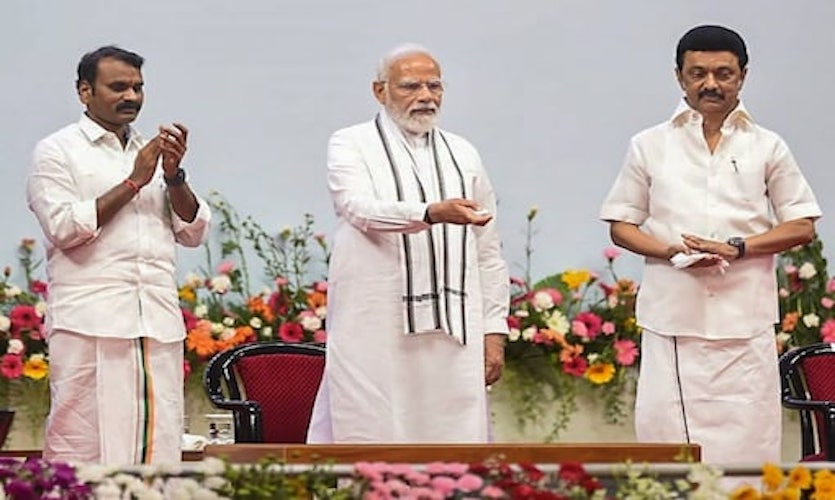On Thursday, addressing an event at the Jawaharlal Nehru Stadium in Chennai, Dravida Munnetra Kazhagam (DMK) leader and Tamil Nadu Chief Minister MK Stalin urged Prime Minister Narendra Modi to make Tamil an official language at Union government offices, and the Madras High Court.
During the event, PM Modi laid the foundation stone for 11 projects worth Rs 31,500 crores. “The schemes that are being inaugurated today are extremely important for the state. We are ahead in education, health, economy, and so on. The role of Tamil Nadu in the growth story of India is very important,” said MK Stalin during his speech.
“Make Tamil the official language like Hindi and the official language in Madras High Court…Tamil should be considered equal to Hindi,” said the CM. Notably, under the previous Congress-led United Progressive Alliance (UPA) government, the language got its status as a “classical language”. In fact, it was the first language to gain that status in 2004, followed by Sanskrit (2005), Kannada and Telugu (2008), Malayalam (2013) and Odia (2014), subsequently.
On the other hand, while addressing the event, PM Modi called the Tamil language “eternal”, and called its culture “global”, while also indicating how the Union government is committed to popularising both. The Centre hopes to achieve this with the recently opened Subramania Bharathi chair at the Banaras Hindu University and the National Educational Policy (NEP) playing a crucial role.
During his address, the Tamil Nadu CM also urged the Centre to acknowledge and exempt the state from the National Entrance-cum-Eligibility Test (NEET), a bill that has already been passed by the state assembly. However, the bill is yet to be forwarded by Governor RN Ravi to the Centre. Previously, CM Stalin has remarked that he does not need the governor to approve the bill but only to send it for Presidential assent, “like a postman”. The state argues that the NEET exam favours people who can afford private tuition and denies opportunities to poor students.
The DMK supremo has also sought additional funding for the state, and outlined how its plans for growth are unique as they are based not merely on economic parameters but on the ‘Dravidian model’ of inclusive growth. Some of the model’s aspects include social justice, equality, and women empowerment. Furthermore, he emphasised and urged PM Modi to “uphold the true spirit of cooperative federalism”, and demanded that the central government enhance funding for projects in Tamil Nadu.
CM Stalin also said that the GST compensation period must be extended beyond June 2022, for another two years. He also called for the “retrieval” of Katchatheevu, a 163-acre uninhabited island which was surrendered by India in 1974, to Sri Lanka. Notably, this was PM Modi’s first official visit to the state after DMK formed the government after beating the All India Anna Dravida Munnetra Kazhagam (AIADMK) in the last assembly polls.
The two leaders shared a stage to launch a number of infrastructure projects in Tamil Nadu. However, later in the day, the state’s BJP chief, K Annamalai, described in a series of tweets how “absolutely ashamed” he was. He called the CM’s conduct in the presence of PM Modi “appalling”. “I am absolutely ashamed by the appalling conduct of TN CM @mkstalin. Hon PM @narendramodi had come, not for a BJP programme. Our CM was expected to show grace but ended up disgracing himself,” read Annamalai’s tweet. He brought up the series of demands made by CM Stalin, first questioning the “sudden awakening” that CM Stalin had. He stated that the CM forgets that the island was “gifted” to Sri Lanka by former prime minister Indira Gandhi, and since 1974, the DMK has formed an alliance with the Congress and “looted” people together.
Furthermore, the BJP state chief addressed the issue of GST raised by Stalin and wrote, “CM must be schooled that the GST council decisions were always taken by consensus. On compensation too, the TN Government took the option which provides payment of balance compensation after July 2022.” He added how the incumbent government was “making issues out of non-issues”.
Over the CM’s remark on federalism, Annamalai indicated how the GST Council is a “shining example” of federalism, and explained that the dues are paid as per a formula jointly worked out. “CM @mkstalin thinks that only his whims should matter. Typical dynastic entitlement that doesn’t understand consensus,” he added. He further asserted that GST revenues have “increased significantly” over the past year and have been benefitting every state, including Tamil Nadu. “But, does @mkstalin or DMK ever care for facts? They are only interested in politics,” commented the BJP leader.
Lastly, he addressed the language issue and went on to highlight how PM Modi expressed his affection for the Tamil language, literature and culture. “I don’t think @mkstalin needs an answer because I am sure he also does not believe what he said on the issue. He was only doing petty politics,” stated Annamalai.
This is not the first time DMK leader MK Stalin has raised the demand to make Tamil an official language. Earlier this month, he wrote to PM Modi and Chief Justice NV Ramana, urging them to make Tamil the official language of the Madras High Court, citing examples of high courts in Rajasthan, Madhya Pradesh and Uttar Pradesh, where Hindi, along with English, has been authorised as an official language.
Interestingly, as per Article 348 (1) of the Indian constitution, all Supreme Court and High Court proceedings, and authoritative texts such as Bills or amendments introduced, Acts passed by any House of the Parliament, and all orders, rules, regulations and bye-laws passed by the Parliament or state legislature, shall be in English language. While Article 348 (2) allows Hindi or any other official language of the respective state to officially be used in the High Court (with prior consent of the President of India), the English translation of the same shall be deemed as the authoritative text as per Article 348 (3).










